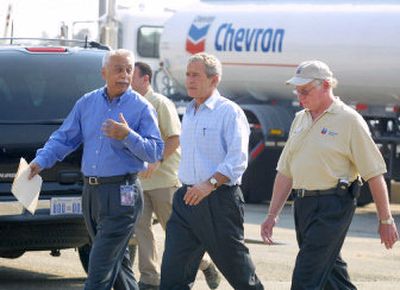Hurricane forces new priorities on Bush

WASHINGTON – Hurricane Katrina swamped President Bush’s second-term domestic agenda, reordering his priorities and changing the political landscape.
His open-ended commitment to rebuild New Orleans and the Gulf Coast has become his No. 1 domestic imperative.
Swept away was Bush’s pledge to cut the budget deficit in half. His centerpiece proposal to restructure Social Security – in trouble even before the storm – probably is a casualty, too.
Also suddenly endangered are his proposals to make permanent certain tax cuts, repeal the estate tax, overhaul immigration law and rewrite tax laws.
“Congress’ fall legislative agenda has been significantly modified,” Senate Majority Leader Bill Frist, R-Tenn, said last week as the long-term costs of the hurricane grew clearer.
Five years into his presidency and with his approval ratings at an all-time personal low, Bush also is enduring increasing criticism from deficit hawks in his own party.
Conservatives are not challenging Bush’s commitment to federal relief and reconstruction spending that could rise to over $200 billion. But they are clamoring for offsetting spending cuts in other areas.
That could further jeopardize a variety of Bush’s initiatives before Congress, even though Bush pledged on Friday to cut unnecessary spending. “It’s going to cost whatever it’s going to cost,” he said.
While Bush sought unity in the storm’s aftermath, Democrats are not backing down from their opposition to items in his overall agenda, particularly extending the tax cuts.
“Political capital is limited and the president has overestimated that badly this year,” said George C. Edwards III, professor of political science at Texas A&M University. “He thought he had a mandate and he didn’t.”
Because of his sinking approval ratings, Bush is going to have a tough time getting congressional support for many of his proposals, said Karlyn Bowman, a public opinion analyst from the American Enterprise Institute, a conservative think tank in Washington.
“I think you’ve already seen the evidence of that on Social Security. You have a united wall of Democratic opposition and he hasn’t been able to penetrate that,” Bowman said.
Bush’s proposal to let younger investors divert some Social Security taxes into individual investment accounts – in exchange for lower guaranteed benefits in the future – has won little public support.
Even among Republicans, backing for the idea has dwindled. Last week, Rep. Tom Reynolds of New York, the head of the House Republican campaign committee, urged fellow GOP leaders to drop plans for Social Security legislation this year. He cited potential repercussions in the 2006 elections.
Now with Katrina, it is going to be even harder for Bush to convince lawmakers they should pay attention to Social Security or tax overhaul.
Frist and House Majority Leader Tom DeLay, R-Texas, said many items on Bush’s earlier agenda – making capital gains and dividend tax cuts permanent and repealing the estate tax, for example – are just being postponed because of Katrina, not abandoned.
As for the mounting deficit, DeLay said: “When you’re at war or you have a major disaster like this, it makes sense to borrow money to pay for it.”
Democratic leaders say now is not the time to consider extending tax cuts or providing new ones. “I can’t imagine they would do that to the American people,” Senate Minority Leader Harry Reid, D-Nev., said of the GOP leadership.
White House budget director Joshua Bolten said Katrina relief spending will “undoubtedly have some effect on our deficit position in the short run.”
But, he said, “This spending is essential.” He predicted broad bipartisan support.
Bush ruled out raising taxes to help offset the cost of Gulf Coast reconstruction. “You bet it will cost money, but I’m confident we can handle it,” he said Friday during a news conference with Russian President Vladimir Putin.
In his speech to the nation from New Orleans, Bush said Thursday the federal government would pick up the bulk of the tab for rebuilding highways, bridges, sewer lines and other major structures.